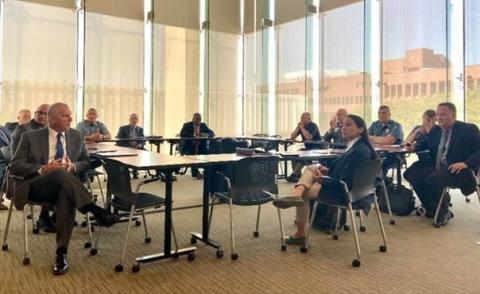Davids Discusses Fentanyl Epidemic with Local, State Law Enforcement
Yesterday, Representative Sharice Davids joined local, state, and federal law enforcement officials for a summit regarding the growing threat of fentanyl, the number one cause of overdose death in the United States. Davids received a briefing on current efforts to address the issue and spoke with the law enforcement officials on the challenges they face, measures utilized now, and possible long-term solutions.
"In our state and around the country, the fentanyl crisis has become a public health emergency. This summit was an eye-opening look at how that is impacting our communities here in the Kansas Third," said Davids. "I am committed to working with the law enforcement officials I met with today to fight this crisis head-on, because one death is one too many. I appreciated the opportunity to learn more and will continue these conversations with law enforcement, public health officials, and those in our community impacted most."

Rep. Sharice Davids with local law enforcement officers during her fentanyl summit.
Davids recently met with Libby Davis, a Johnson County resident, whose son passed away last year after taking a counterfeit pill that was unknowingly laced with fentanyl. Fentanyl is a synthetic opioid that is 80-100 times stronger than morphine and is increasingly found in fake prescription pills such as Vicodin, OxyContin, or hydrocodone. Following their meeting, Davids co-sponsored and helped pass legislation through the House that creates a public awareness campaign about synthetic opioids through the Department of Health and Human Services.
Summit attendees included leadership from the Overland Park, Olathe, and Kansas City, Kansas Police Departments as well the Kansas Highway Patrol, Kansas Bureau of Investigation, and the Drug Enforcement Administration.
Community members looking to learn more about how to keep their families safe can visit FirstCallKC, a local organization working to reduce the impact of alcohol, drugs, and addiction in the Kansas City area. Resources and prevention services for individuals, families, schools, and others are available on their website.